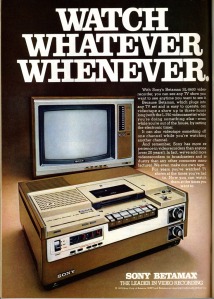
Quite a bit of our time has been spent discussing the many merits or faults in digitizing history. It is indeed a debate that, at least among the historical community, still rages on. But what this feels like to me is spending so much time debating film versus VHS versus BetaMax. While it’s an important discussion to have a first, I’m ready to get to meatier issues. I think a lot of these debates will be settled shortly in favor of various digital formats. Technologies such as Google Books will continue to improve, and it will be time to stop worrying about whether or not scanned books are a legitimate source for research, and we can get back to studying the things that interest us most.
As we discuss various techniques for design and How a Web Design Goes Straight to Hell, it might be time to go back to the beginning and ask, “Do I have something to say? Is there a story here?” All the flash animations and pyrotechnics on the internet won’t help you if you don’t have a strong idea and realistic characters.
It takes a whole production team to make a successful movie, and it’s going to take more than one person to make a successful digital history project. Instead of reading text books that will tell us what fonts to use and encourage us to become fluent in html, perhaps it’s more useful to think of yourself as the director of your project. If you were making a movie, you would hire a cinematographer, and a separate editor and not find this unusual. Why should your digital history project be any different? You would still have creative control, but it should be totally expected that you bring on people that have a specific eye toward design when you might not.
And this is where I think the really conflict is for historians. Filmmakers have been going through this on a fairly regular basis since Train Pulling Into a Station premiered in 1895: As the equipment and resources get less expensive and easier to use, people who were not necessarily trained in the field become able to create. This can be amazing. Suddenly, people who are passionate about history are able to find rare books in Google Books and articles on the internet, and even without the funding of a university or backing of a museum, they are able to become historians. Innovations are made by people from other backgrounds. Of course for every Citizen Kane (Written, Directed, and Starring Orson Welles, who had no formal film training), there are plenty of Manos: The Hands of Fate (Written, Directed, and Starring Harold P. Warren, a salesman who made Manos on a bet. It is largely considered one of the worst movies ever made.)
Your website could go either way.
But is is worth stumbling upon several Manos before you find the Kane in the digital history field? I personally think it’s time to let amateur historians enter this new medium with us. They could being new skills and new ways of looking at the world, and perhaps truly change the way historians practice their art.

It is an interesting point you bring up about letting amateur historians in the medium. It seems as though they can be valuable and push professionals out of their box a little, as well as spur some healthy competition.
LikeLike
I like your media comparisons! I think it is important to have a wide variety of voices to speak on a subject, regardless of the level of training. Because there are still things you can learn from the Manos of the world, even if it is only what not to do.
LikeLiked by 1 person